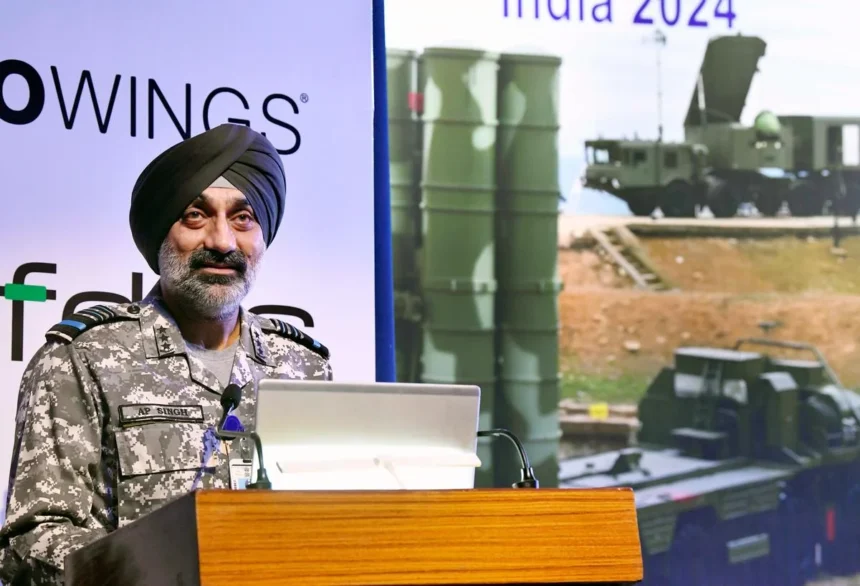NEW DELHI – India’s Air Force Chief, Air Chief Marshal Amar Preet Singh, broke his silence on Saturday about a high-stakes aerial clash with Pakistan in May. Singh said India’s air defences brought down five Pakistani fighter jets and a large military transport during what was called Operation Sindoor.
He made these remarks during the 16th Air Chief Marshal L.M. Katre Memorial Lecture in Bengaluru. Singh praised the performance of the Russian-made S-400 missile system, crediting it for these hits. He referenced electronic tracking logs and highlighted one shot taken from 300 kilometres away, calling it the “biggest surface-to-air hit” recorded.
This statement is India’s first official admission regarding Pakistani air losses in the fighting, which broke out following a terrorist attack in Pahalgam, Kashmir, on 22 April that left 26 civilians dead.
The fighting between 7 and 10 May marked a sharp rise in hostilities between the two nuclear-armed neighbours. Tensions boiled over after India responded to the Pahalgam tragedy with cross-border airstrikes against what it termed terrorist camps in Pakistan.
The Indian strikes reportedly destroyed facilities used by Jaish-e-Mohammed and Lashkar-e-Taiba in Bahawalpur and Muridke.
Singh detailed how Indian forces also hit several Pakistani airbases, among them the Shahbaz base in Jacobabad, where a hangar sheltering U.S.-built F-16s was damaged. Other reported targets included command centres, radar sites and runways.
Pakistan has rejected India’s account. Defence Minister Khawaja Muhammad Asif called the claims “untrue” and “absurd,” saying they were meant for local political gain.
He posted online that India should allow outside experts to count its aircraft, warning such statements could cause serious misjudgements in a region armed with nuclear weapons.
According to Pakistan, none of its jets were shot down. Instead, it claims to have destroyed six Indian aircraft, including three Rafale fighters, a statement India says is false.
No independent source has confirmed losses on either side. While some outlets, such as CNN, have mentioned evidence that supports Pakistan’s claim of downing Indian jets, Indian officials insist these reports are wrong.
France’s air chief, General Jerome Bellanger, acknowledged reports of three Indian jets lost, including a Rafale, while India’s Chief of Defence Staff, General Anil Chauhan, admitted to losing aircraft but refuted Pakistan’s numbers. With both nations sticking to their own stories and no outside confirmation, confusion and tension are growing.
Pakistan’s Nobel Nomination
In a surprise diplomatic move, the Pakistani government nominated former U.S. President Donald Trump for the Nobel Peace Prize. Officials said Trump’s push for talks brought about a truce that ended the May fighting. Islamabad credits its administration with using trade discussions to get both sides to step back, though India contests this.
Trump has commented that “five jets may have been shot down,” but did not say which country’s aircraft they were. He continues to claim his team played a big part in cooling the situation. Pakistan’s move to nominate him for the award suggests a new tilt towards Washington, even as it maintains tight links with China. Yet, some U.S. officials report no evidence that Pakistan’s F-16s were harmed, putting India’s claim in doubt.
Relations between India and the U.S. have become strained in recent months after Trump slapped a 50% tariff on Indian imports, calling it punishment for India’s continued buying of Russian oil.
Along with criticism over how India handled the May clashes, this has made New Delhi wary of its long-standing partnership with Washington. Many in India now feel the U.S. is favouring Pakistan over them.
Pakistan, meanwhile, appears to be drawing closer to the U.S. as a way to balance its dealings with China. While it still gets Chinese military equipment and loans, recent signs from Washington, including Trump’s involvement in the ceasefire, have strengthened its ties in the West.
Pakistan’s move to support Trump for the Nobel Peace Prize seems to fit this change in direction, especially as China’s influence comes under fresh scrutiny.
The differing accounts from New Delhi and Islamabad are keeping the region on edge. India talks up military success to show its strength and discourage more attacks, while Pakistan uses denial and closer relations with the U.S. to signal a shift in alliances.
With both countries armed with nuclear weapons and refusing outside investigation, the risk of a bigger crisis remains.
Sporadic firefights continue in Kashmir, as shown by a recent deadly exchange in Kulgam that left two Indian soldiers and one suspected militant dead. Calls for calm from the international community have grown stronger.
At the same time, the Nobel nomination has added more drama to an already complex situation. For now, the facts surrounding May’s air battles remain clouded by rivalry, as the world watches two nuclear powers wrestle for influence and security.














